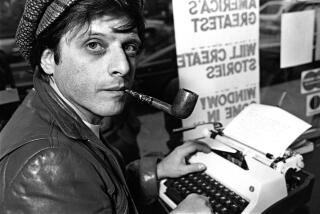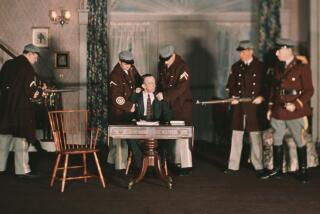‘Invisible Man’ Helped Americans to See Each Other
- Share via
Monday marks the 90th anniversary of the birth of Ralph Ellison, whose landmark novel “Invisible Man” made “invisibility” a metaphor for our inability to see each other’s full humanity. Published in 1952, the novel chronicles a black man’s search for identity in an America that refuses to “see” him. As Americans struggle today to become more colorblind in their public and private interactions, Ellison’s writings offer much to improve our social and political vision.
Ellison, who died in 1994, observed that the “high visibility” of blacks in a predominantly white America made their individuality “un-visible” to most whites. “If the white society has tried to do anything to us,” he remarked, “it has tried to keep us from being individuals.” But though the nation’s founders committed the “sin of American racial pride,” they also committed the ideal of human equality to paper. In so doing, Ellison believed they gave blacks and other minorities the firmest ground for the extension of America’s promise to all of its citizens.
Which is why Ellison rejected the call for “black power” that came in the waning years of the modern civil rights movement. “You don’t get rights by destroying them,” he argued. His devotion to the Constitution as “the still-vital covenant by which Americans of diverse backgrounds, religions, races and interests are bound” was too patriotic for black nationalists.
Ellison noted the irony in black leaders decrying individualism, while they themselves were “doing all they can to suppress all individuality but their own.” At a 1966 Senate hearing on cities, Ellison advised that laws “should grant to each Negro his individuality.” This would help the diverse individuals within the U.S. get “to know one another without the myths of racial inferiority or superiority.”
Here he channeled the muse of Frederick Douglass, who believed that the so-called “Negro problem” would disappear as soon as the government stopped treating blacks differently from whites.
Simply put, Ellison did not believe that race should be the measure of anyone’s rights. When it comes to securing the rights of all Americans, it’s the minority of one -- the individual -- that should be the focus of the Constitution’s protection.
Of course, this belies current pleas for group representation to promote diversity. Driven by an identity politics hostile to the rights of the individual, today’s affirmative activists have Balkanized college campuses as they seek to entrench a system of color-coded benefits and burdens. But according to Ellison’s invisible man, “It’s ‘winner take nothing’ that is the great truth of our country or of any country.”
A truly common good will arise as we protect the diversity of each individual, and not the racial isolationism of misguided multiculturalists. “Let man keep his many parts, and you’ll have no tyrant states.”
Though Ellison was a New Deal Democrat to the core, his writings were anything but doctrinaire reflections of modern-day liberalism. A man who received the Presidential Medal of Freedom from Lyndon Johnson and the National Medal of Arts from Ronald Reagan can hardly be placed in a political box. Writing as the consummate “insider-outsider,” Ellison offered his prose as an appreciative critique of American society. In this, he echoed Alexis de Tocqueville, who wrote in “Democracy in America” that “it is because I was not an adversary of democracy that I wanted to be honest with it.”
When Ellison received the National Book Award for “Invisible Man,” he said he modeled his effort after an earlier generation of American writers who “took a much greater responsibility for the condition of democracy.” He hoped to cultivate “articulate citizens” who would go on to lead a nation whose true goal was “not simply material well-being, but the extension of the democratic process in the direction of perfecting itself.”
Ellison said of his novel, “My task was one of revealing the human universals hidden within the plight of one who was both black and American.” In a way yet to be surpassed, his fiction and essays moved our political ideals and shortcomings to the foreground of American literary consciousness.
Ellison left a legacy that can inform 21st century discussions of affirmative action, black reparations, the achievement gap in education and other social and political problems ill served by the prevailing civil rights establishment. Amid forces bent on preventing what he called “the natural recognition of the reality of black and white fraternity,” Americans can look to Ellison for a better vision of how the nation can better align its practice with its highest ideals.
More to Read
Sign up for Essential California
The most important California stories and recommendations in your inbox every morning.
You may occasionally receive promotional content from the Los Angeles Times.










